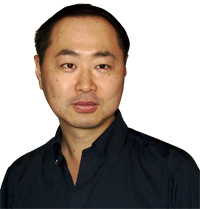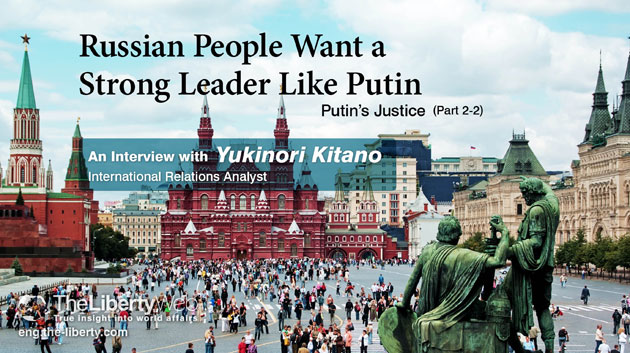Russian People Want a Strong Leader Like Putin (Part 2-2)
An Interview with Yukinori Kitano
Because Russia continued to receive harsh criticism from the international community, The Liberty staff decided to meet with international relations analyst Yoshinori Kitano, who resides in Moscow, and find out what has really been happening on the ground in Russia, which the Western media has not reported.

Yoshinori Kitano
International Relations Analyst
Yoshinori Kitano was born in Nagano in 1970. He graduated from the Department of International Relations in the Moscow State Institute of International Relations. He previously served as an advisor to the President of Kalmyk Autonomous Republic, and once launched a mail magazine named the “Russian Politics and Economy Journal”. His written works have included, “Putin’s Last Crusade,” “Putin’s Supreme Discourse on Japan’s Independence,” (both from Shueisha International), and many others.
Many Russians approved of the annexation of Crimea because they believed that Crimea was originally a Russian territory. Khrushchev, the second leader of the Soviet Union and successor to the dictator Stalin, had a weak political support base compared to Stalin. He therefore tried to solidify Ukrainian support by moving Crimea, which belonged to Russia until then, into Ukrainian jurisdiction in 1954. Both Russia and the Ukraine were Soviet territories so there were no problems at the time. However, Russians in both Russia and Crimea later became angry with Khrushchev’s self-righteous actions, and have continued to view Crimea as a Russian territory even after the fall of the Soviet Union.
Russian media has covered mass demonstrations in the Ukraine and how armed militants have been occupying local government buildings. It has reported concerns over the possible persecution of Russian residents, and Russian public opinion has heavily favored rescuing the Russians in Crimea from any potential massacres.
It was in this environment that President Putin annexed Crimea in the name of protecting its Russian residents, and his approval rating went from 60% in January to 83% today.
Western Nations Have Continued to Pressure Russia
Western media has criticized Mr. Putin for being an “aggressor”. However, if Mr. Putin was really driven by territorial ambitions, he would have long ago used military force to take eastern Ukraine which has many ethnic Russian residents.
While it is easy to describe Russia’s actions as an “invasion”, gaining new territory also means taking on additional liabilities in the form of investments and pensions for the new residents. The Russian economy has been in a slump since the Lehman shock of 2008, and the already troubled economy is expected to worsen. In addition, Western sanctions are expected to result in negative economic growth for Russia this year.
After the fall of the Soviet Union, the Western coalition, represented by NATO and the EU, attempted to weaken Russia out of fear of its revival. It is comparable to how the United States, after having been victorious in the war, forced a Constitution and a masochistic view of history on Japan.
NATO and the EU incorporated many countries that had previously been under the Soviet sphere of influence until they finally reached the Ukraine which sits adjacent to Russia. Their actions have resulted in Russian apprehension regarding its security environment.
Ukraine is divided between its pro-Russian eastern region and its pro-Western western region. This has manifested itself in a constant political dilemma for Ukraine over which sphere to side with, and its leadership has been constantly switching between pro-Western and pro-Russian presidents.
This most recent crisis was triggered when pro-Russian President Yanukovych decided to postpone joining the EU due to current unfavorable conditions present in the contents of the latest agreement. The pro-Western faction protested, and ousted the president.
Russians Seek Order over Freedom
Mr. Putin has been criticized for being a dictator. However, I live in Russia, and I do not feel as if my freedoms have been infringed upon. I don’t hear the criticisms of Mr. Putin on television, but there are a lot out there on the internet.
Russians today seek order over freedom. The cause is said to be that during the advance of freedom and the deregulations of the 1990s, society broke down. At that time, President Yeltsin implemented capitalism, recognized the freedom of speech, and privatized state-owned businesses. However, the nation fell into chaos as the GDP dropped 43% from 1992 to 1998.
For that reason, Russian citizens looked for a stronger leader like Mr. Putin.
Russian citizens have been dissatisfied about government corruption such as bribery. For instance, to set up a shop, you have to bribe the mafia, the police, and the finance ministry, resulting in two to three layers of costly bribes. Citizens, of course, don’t belive that Mr. Putin has been responsible for it. To be sure, there has been an autocratic side to Mr. Putin, but I do not think that he has intended to intervene in the private lives of his citizens.
Japan Must Prevent a China-Russia Entente and Work to Contain China
Due to the crisis in the Ukraine, Japan is going along with the Western sanctions against Russia. However, for Japan, China is still its biggest problem.
Mr. Putin has expressed gratitude towards China, who did not go along with the sanctions, and his stance has resulted in closer ties between Russia and China. If Japan and China were to clash over the Senkaku Islands and Russia were to side with China, then Japan would find itself in an untenable position. Japan, while continuing to emphasize its alliance with the United States, must put a wedge between Russia and China, and persuade Russia to join the China containment policy.



















